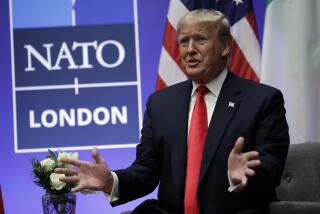Warning to 3 Nations Downplayed
- Share via
WASHINGTON — Despite his threatening words toward the three nations he characterized as the “axis of evil,” President Bush apparently does not intend to launch major new military initiatives against Iraq, Iran or North Korea--yet.
U.S. officials scrambled Wednesday to temper the tone of the president’s first State of the Union speech, in which he said the United States “will not wait on events while dangers gather,” specifically citing the three nations’ programs on weapons of mass destruction.
For now, administration sources said, the Bush administration does not intend to break off efforts to negotiate a missile deal with North Korea that would end its production and exporting of ballistic missiles. The administration’s offer of a dialogue with Iran on nuclear, biological and chemical weapons and other disputes is still on the table. And its top demand of Iraq is still that Baghdad allow U.N. inspectors to return after a four-year absence to track and destroy Iraq’s remaining weapons of mass destruction.
“The president emphasized his determination on this issue but did not change current efforts or U.S. strategy,” a senior administration official said Wednesday. “He did not take anything away from the military options, but he did not name the next three countries the United States is going to attack.”
At the White House, spokesman Ari Fleischer said the use of the term “axis of evil” was “more rhetorical than historical,” referring to the use of the term “axis” to describe Germany, Italy and Japan during World War II.
“But it’s an expression of how serious the president takes protecting our country. As the president said, time is not on our side. The president will be deliberate,” Fleischer said.
With the war in Afghanistan still its primary focus, the Bush administration appears to be conducting psychological warfare against the three regimes. The White House is not cutting off the prospect of diplomacy, but the president did signal a greater willingness to act decisively if the three governments continue to balk.
Baghdad, Tehran and Pyongyang have effectively been put on formal notice that their actions are now high on the U.S. list of foreign policy priorities--and Washington will not allow them to stall indefinitely.
“I will not wait on events while dangers gather--the United States of America will not permit the world’s most dangerous regimes to threaten us with the world’s most destructive weapons,” Bush said.
The United States is, however, already trying to increase the pressure on all three countries, according to U.S. officials. The State Department hosted Russian officials this week for talks on further limiting Moscow’s military exports to Tehran. Washington has also become more insistent about arrangements for inspections in North Korea.
But the president’s pledge to “do what is necessary” did set off a storm of reaction Wednesday in all three capitals.
Iraqi officials scoffed at Bush’s charge that Baghdad has been plotting to develop anthrax, nerve gas and nuclear weapons. A senior member of the ruling Baath party charged that Washington is preparing the world for another American offensive in the oil-rich Gulf nation.
“Little Bush’s accusation against Iraq is baseless,” said Salim al-Qubaisi, chairman of the parliament’s foreign relations committee. “The American administration led by Bush has been threatening Iraq from time to time to prepare world public opinion for a new aggression against Iraq.”
However vague Bush’s threats were, they encouraged leaders of the opposition Iraqi National Congress, who were in Washington on Wednesday and secured renewed U.S. funding--$2.4 million over three months--for its campaign to overthrow Saddam Hussein. The funding had been suspended over an accounting dispute, and the new money is considered a stopgap measure while that dispute is investigated.
In Iran, Foreign Minister Kamal Kharrazi rejected Bush’s allegations that Tehran “aggressively pursues” weapons of mass destruction and exports terror “while an unelected few repress the Iranian people’s hope for freedom.”
Kharrazi told state-run radio that Washington should provide proof of its charges.
“We reject the U.S. accusations and we think that the world will not tolerate the hegemony of the U.S,” he said. “The American president had better back up his assertions with evidence instead of repeating old and unfounded claims. . . .”
Former president Hashemi Rafsanjani, now head of Iran’s powerful Expediency Council, condemned Bush’s “combative tone.” “It is possible that Americans will cheer Bush as the congressmen did, but we will not be threatened by such aggressive language,” said Rafsanjani, as quoted by state-controlled media.
North Korea also blasted the U.S. administration for charging that it has missiles and other weapons of mass destruction.
A commentary in the state-owned media said the “U.S. loudmouthed threat” was intended to justify the U.S. military presence in South Korea and a policy of aggression against the communist regime.
*
Reuters contributed to this report.
More to Read
Sign up for Essential California
The most important California stories and recommendations in your inbox every morning.
You may occasionally receive promotional content from the Los Angeles Times.










